integrity we demand Of an artist is a rarer thing
than that which we testify to (perhaps) in a politi- cian. Lawrence himself, in postulating it as the essential aim in both life and art, insisted on the most exacting conception and criteria. He is insisting on them in his caveats against 'will' and 'idea' (terms, in his use of them, intimately re- lated).
`Will' and 'idea' certainly play a part in Lady Chatterley's Lover that the normal creative and critical Lawrence would have diagnosed and condemned. He is not the normal Lawrence in this novel—a point unwittingly made by one of the experts in the trial when, exalting Lawrence's 'integrity. of purpose, he says that the book might almost be called a tract (though there is a con- sensus among the witnesses that it is something else). Lawrence, of course, meant it to have the integrity of a creative work. But at this moment of his life he was too possessed by his passionate didactic purposes to be capable of achieving that, or of recognising his failure the was ill---in fact, for all his incredible vitality, slowly dying--and inflamed with rage and disgust at the thought of the 'virginal pure policemen). That this was his state, this the essential case, should be manifest to the reader in the business of the 'four-letter words.' The intense earnestness of the hygienic aim can't be doubted, and I needn't discuss whether or not we can reasonably think of it as justified by probable success: it is a hygienic pur- pose,' that is the unanswerable point I have to make. We have here, in obviously questionable relation to creative integrity, the assertive presence of 'will' and 'idea.'


































 Previous page
Previous page